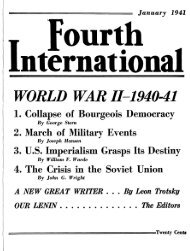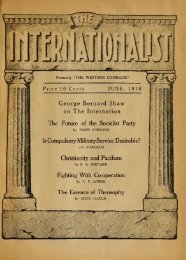National Liberation Movements and the Question of Socialism ...
National Liberation Movements and the Question of Socialism ...
National Liberation Movements and the Question of Socialism ...
Create successful ePaper yourself
Turn your PDF publications into a flip-book with our unique Google optimized e-Paper software.
If unqualified support is given to a national li~eration<br />
movement, it may well mean support for cap1tal:<br />
ists. Fur<strong>the</strong>r, since <strong>the</strong> capitalists <strong>of</strong> <strong>the</strong>se colon1al<br />
countries do not want to establish a d~cent, humane~<br />
working class society but want to cont1nue to explo1t<br />
<strong>and</strong> oppress--on <strong>the</strong>ir terms ra<strong>the</strong>r than those <strong>of</strong> <strong>the</strong><br />
foreign capitalists--(in fact, <strong>the</strong>y do not even want<br />
total independence but prefer to remain within <strong>the</strong><br />
framework <strong>of</strong> <strong>the</strong> world capitalist system) .<strong>the</strong>~ <strong>the</strong>se<br />
leftists are objectively supporting explo1tat1on, .<br />
degradation, etc.; assuming <strong>the</strong>y are honest, <strong>the</strong>y w1ll<br />
eventually be disappointed in <strong>the</strong> performance <strong>of</strong> <strong>the</strong><br />
liberated country <strong>and</strong> may become so discouraged that<br />
<strong>the</strong>y drop out <strong>of</strong> <strong>the</strong> left political movement altoge<strong>the</strong>r.<br />
· 1<br />
Thus it is vitally important that nat1ona<br />
liberatio~ movements are not confused with socialism<br />
<strong>and</strong> that realistic support be given to <strong>the</strong>se movem~nts<br />
<strong>and</strong> a class analysis be undertaken to make sure th1s<br />
support is well-placed. But this dem<strong>and</strong>s cor~ect<br />
(Marxist) <strong>the</strong>ory. Bad practice results fro~ 1ncorrect<br />
(capitalist) <strong>the</strong>ory. This raises <strong>the</strong> quest1on: Where<br />
does this incorrect <strong>the</strong>ory come from?<br />
In "<strong>the</strong> good old days 11 , when an international<br />
communist movement existed in practice <strong>and</strong> <strong>the</strong>re were<br />
solid Marxist <strong>the</strong>oreticians sallying forth to do deeds,<br />
national liberation movements were analyzed from a<br />
class point <strong>of</strong> view. These moveme~ts were.suppo~ted,<br />
to be sure (in fact, more so than 1n tod~y.s per~od),<br />
but <strong>the</strong>y were not supported fr~m a noncr1t1cal, noncl<br />
ass 11 foundation. Ra<strong>the</strong>r, ev1 dence was ga<strong>the</strong>red,<br />
Marxist analysis undertaken, positions set forth <strong>and</strong><br />
support was directed toward a~sisting th~ lower<br />
classes in <strong>the</strong>ir attempts to 1mprove <strong>the</strong>1~ lot. !hus,<br />
one can examine <strong>the</strong> work <strong>of</strong> Lenin or Stal1n on th1s<br />
question in general, or people such as R. Pa~me Dutt<br />
on India to observe that, indeed, a class po1nt <strong>of</strong><br />
view was presented <strong>and</strong> national liberation movements<br />
were not appraised merely as to <strong>the</strong>ir national content.<br />
Now, we have deteriorated sufficiently so<br />
that even <strong>the</strong> Catholic Church finds itself supported<br />
by ostensible Marxists in its efforts to direct <strong>the</strong><br />
14<br />
movements in Latin America (<strong>and</strong> Eastern Europe) into<br />
safe, non-revolutionary, capitalist channels.<br />
With <strong>the</strong> triumph <strong>of</strong> revisionism in <strong>the</strong> Soviet<br />
Union <strong>and</strong>, for all practical purposes, <strong>the</strong> destruction<br />
<strong>of</strong> <strong>the</strong> international communist movement, <strong>the</strong>oretical<br />
leadership was wrested from <strong>the</strong> Marxists <strong>and</strong><br />
was h<strong>and</strong>ed to various non-Marxist <strong>the</strong>oreticians who,<br />
none<strong>the</strong>less, paraded as Marxists. This should surprise<br />
no one. In <strong>the</strong> modern period, <strong>the</strong>ory will ei<strong>the</strong>r be<br />
<strong>of</strong> a working class variety (Marxist) or that <strong>of</strong> a<br />
capitalist perspective (in practice, everything else-<br />
even that which appears to be non-capitalist such as<br />
<strong>the</strong> feudal positions taken by <strong>the</strong> pro-Khomeini Iranian<br />
hooligans). In <strong>the</strong> post-war period, <strong>the</strong> dominant<br />
progressive political movement was that <strong>of</strong> national<br />
liberation. In <strong>the</strong> 1960's, with <strong>the</strong> upsurge in political<br />
activity in <strong>the</strong> i~perialist countries, those<br />
\'Jho were active were looking for <strong>the</strong>ory to guide<br />
<strong>the</strong>ir actions. Given <strong>the</strong> significance <strong>of</strong> <strong>the</strong> national<br />
liberation movements, many turned to individuals who<br />
ei<strong>the</strong>r came out <strong>of</strong> those movements or who addressed<br />
<strong>the</strong>mselves specifically to those movements for that<br />
guidance. Thus, in <strong>the</strong> 1960's, <strong>the</strong> heroes <strong>of</strong> <strong>the</strong> left<br />
in <strong>the</strong> United States <strong>and</strong> Europe were not Marx, Engels,<br />
Lenin <strong>and</strong> Stalin (especially not <strong>the</strong> last) but Mao<br />
Tse Tung, Che Guevara, Frantz Fanon, Regis Debray,<br />
Herbert Marcuse, Kwame Nkrumah <strong>and</strong> those who have<br />
come to be recognized as <strong>the</strong> Monthly Review School-<br />
Samir Amin, Andre Gunder Frank, et. al. The influence<br />
<strong>of</strong> <strong>the</strong>se <strong>the</strong>oreticians is enormous: Even people<br />
who have never read a single word by any one <strong>of</strong> <strong>the</strong><br />
above (<strong>and</strong> o<strong>the</strong>rs) have absorbed much <strong>of</strong> <strong>the</strong> political<br />
perspective <strong>the</strong>y have disseminated.<br />
In this article, we shall not present a critical<br />
review <strong>of</strong> all <strong>the</strong> specific features <strong>of</strong> <strong>the</strong> general<br />
<strong>the</strong>ory as set out by <strong>the</strong> above-mentioned <strong>the</strong>orists.<br />
In <strong>the</strong> past, we have subjected some <strong>of</strong> <strong>the</strong> Monthly<br />
Review authorities to scrutiny <strong>and</strong> have undertaken an<br />
analysis <strong>of</strong> one <strong>of</strong> <strong>the</strong> variations <strong>of</strong> this general<br />
<strong>the</strong>oretical approach (see, Science, Class, <strong>and</strong> Politics,<br />
Fall, 1978, #3); <strong>and</strong> an extensive critique <strong>of</strong> <strong>the</strong><br />
perspective <strong>of</strong> Mao Tse Tung is forthcoming. Here,<br />
15
















